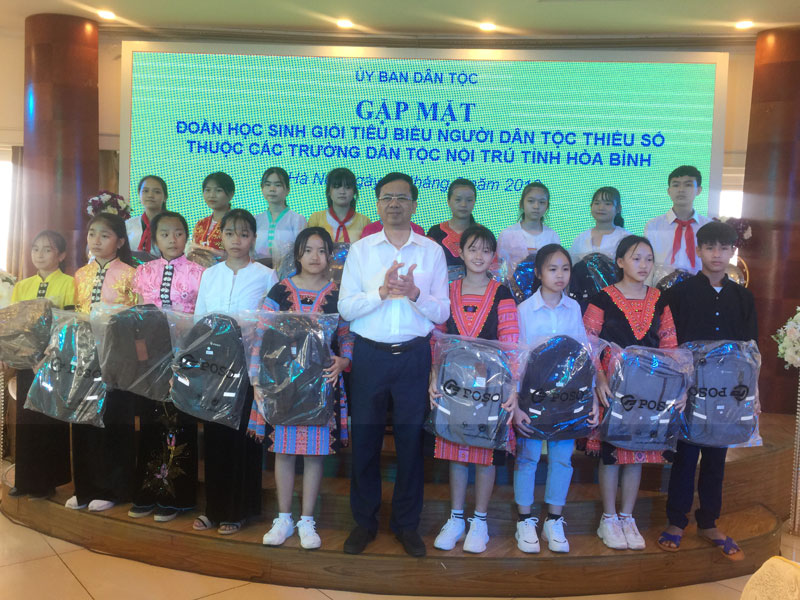
(HBO) – Deputy Minister and Vice Chairman of the Committee for Ethnic Minority Affairs Phan Van Hung recently received a delegation of excellent students from Hoa Binh province’s ethnic boarding schools. The delegation comprised of 50 students and lecturers led by a leader of the provincial Committee for Ethnic Minority Affairs.
 Deputy Minister and Vice Chairman of the Committee for Ethnic
Minority Affairs Phan Van Hung presents gifts to Hoa Binh’s ethnic students
with excellent academic results.
Deputy Minister and Vice Chairman of the Committee for Ethnic
Minority Affairs Phan Van Hung presents gifts to Hoa Binh’s ethnic students
with excellent academic results.
Reporting to Deputy Minister and Vice Chairman of the
Committee for Ethnic Minority Affairs Phan Van Hung, the leader of the
provincial Committee for Ethnic Minority Affairs said during the 2018-2019
school year, the local ethnic education work was strengthened and developed. The
scale of specialised schools remained stable, good teaching and learning
practices were maintained, and education quality improved. The province is home
to 13 boarding and 13 semi-boarding schools which follow curricula set by the
Ministry of Education and Training. At present, the province is fostering
ethnic minority language education for officials and cadres working in remote
and mountainous areas. On September 8, 2016, the provincial People’s Committee issued
the decision approving Muong ethnic alphabet and a plan to use it.
At the meeting, several students, lecturers and the leader
of the provincial Committee for Ethnic Minority Affairs suggested the Committee
for Ethnic Minority Affairs work with ministries, agencies to provide funding
for infrastructure and equipment at schools and increase aid for students at
semi-boarding schools.
Deputy Minister Hung lauded students and lecturers for
overcoming difficulties. He hoped that they will strive to build on the past
achievements and contribute to local development. At the same time, he asked
the provincial Committee for Ethnic Minority Affairs to create favourable conditions
for ethnic and boarding students in the locality.
On the occasion, Hung presented gifts to local ethnic
students with excellent academic results./.
The Standing Board of the Hoa Binh provincial Party Committee has agreed in principle on a proposal by the Standing Board of the Party Committee of Hoa Binh city to gather feedback on the city’s 1:2000 zoning plan, which forms part of its broader urban development strategy.
Hoa Binh province has made notable progress in public administration reform and digital government development, with the satisfaction index among citizens and businesses reaching over 84%, according to recent government evaluations.
Thanks to great efforts by local authorities in recent times, the governance and public administration performance of Mai Chau district has been significantly improved.
In the afternoon of June 6, the Party Committee, the People's Council, the People's Committee and the Fatherland Front of Lac Son district solemnly held a meeting to celebrate the 139th anniversary of the district's founding (1886–2025) and the 79th anniversary of the establishment of the district's Party Committee (1946–2025). There was the attendance of Mr. Bui Van Thang, the Vice Chairman of the Provincial People's Council; Mr. Quach Tat Liem, the Vice Chairman of the Provincial People's Committee; Ms. Dang Bich Ngoc, the Deputy Head of the National Assembly Delegation of the province; as well as the former leaders of the province and district through various periods, who are the natives of the district.
Implementing the Politburo’s Resolution No. 57-NQ/TW on breakthroughs in science – technology, innovation, and digital transformation is a golden opportunity for the northern mountainous province of Hoa Binh to renew growth model, improve competitive edge and shorten digital gap.
Resolution 57-NQ/TW, issued by the Politburo on December 22, 2024, identifies sci-tech, innovation, and digital transformation as strategic breakthroughs to build a developed and prosperous nation. In Hoa Binh province, this spirit is not just a slogan, it’s being put into action through concrete initiatives that form a "new development triangle”: digital citizenship, digital economy, and digital administration.



 Deputy Minister and Vice Chairman of the Committee for Ethnic
Minority Affairs Phan Van Hung presents gifts to Hoa Binh’s ethnic students
with excellent academic results.
Deputy Minister and Vice Chairman of the Committee for Ethnic
Minority Affairs Phan Van Hung presents gifts to Hoa Binh’s ethnic students
with excellent academic results.